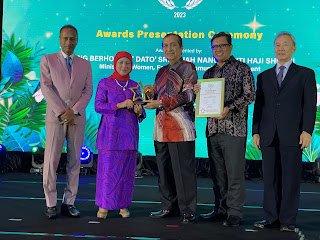KUALA LUMPUR, July 28 (Bernama) -- Avia Solutions Group Chairman, Gediminas Ziemelis highlighted the challenges of factory freighters compared to passenger-to-freighter (P2F) as airlines and air cargo providers are pursuing different strategies when it comes to building up their freighter fleets.
According to KPMG's latest report, last year, 35 orders were made for new 777-200F aircraft, 33 were made for new 777-8Fs, and 20 providers bought new A350Fs. These orders were made by both dedicated air cargo providers and airlines.
Meanwhile, annual P2F conversions have reached historic highs with volume estimated to peak at 180 per year by 2025, and then settle at around 160 aircraft per year. This compares to 70 units per year before the COVID-19 pandemic.
A number of factors are affecting the choice of purchasing either new freighters or P2F conversions in which naturally, cost is a major one, taking into account variables like total order number, fuel burn and maintenance as well as the upfront production costs.
Ziemelis in a statement, highlighted that leasing costs has a massive difference in the baseline costs for new versus converter freighters. The upfront price for a brand new 777-200F or A350F is roughly US$170 to US$185 million, or a monthly lease rate of between US$1.2 and US$1.3 million. (US$1=RM4.54)
By contrast, leasing a 777-300 P2F conversion will cost US$0.6 million per month, or roughly US$65 million to purchase outright. This aircraft is likely to compare well with its production rivals, but at a fraction of the cost.
He further explained that airlines will make savings on P2Fs when it comes to maintenance, repair and operations (MRO), following access to the second hand market for parts, maintaining these aircraft will be considerably less expensive than keeping new planes in operation.
Airbus estimates that an additional 1,040 freighters will need to be added to the global cargo fleet by 2041, as Boeing's forecasts are even more confident. Buying new cargo freighters to meet this need carries significant risk for airlines.
Ziemelis explained that there is little to be gained in performance and capacity from purchasing a new freighter as P2F conversions are capable of matching new production freighters in terms of volume, and they have notable advantages when it comes to maintenance and production.
Ultimately, conversions represent a much lower financial risk, enabling airlines to sustainably ramp up their air cargo capacity, which is why significant growth in P2F conversions can be seen, while the delivery of new freight aircraft has stagnated.
Ziemelis is an accomplished Lithuanian entrepreneur, business consultant, and the founder and current Chairman of the Board of Avia Solutions Group, one of the largest global Aircraft, Crew, Maintenance and Insurance (ACMI) providers, operating a fleet of 180 aircraft.
-- BERNAMA







